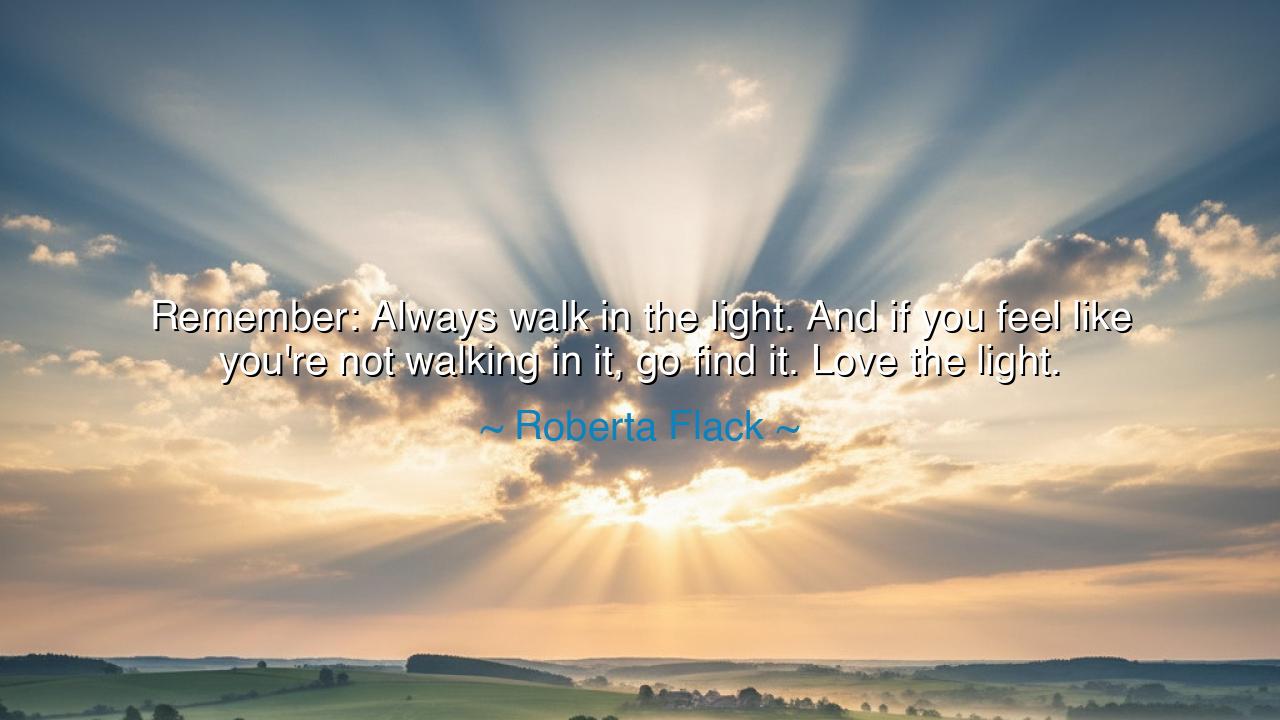
Remember: Always walk in the light. And if you feel like you're
Remember: Always walk in the light. And if you feel like you're not walking in it, go find it. Love the light.






In the gentle but enduring wisdom of her voice, Roberta Flack, the songstress whose music has long stirred hearts across generations, once said: “Remember: Always walk in the light. And if you feel like you’re not walking in it, go find it. Love the light.” These words, though simple in form, shine with profound spiritual radiance. They are not merely a singer’s reflection on life — they are a guiding star for the soul. For in her words, the light is more than brightness; it is the essence of truth, goodness, and divine love. It is the force that leads the heart out of confusion and back toward peace.
The origin of this wisdom is rooted in both faith and experience. Roberta Flack, known for songs that stir the spirit — “The First Time Ever I Saw Your Face,” “Killing Me Softly,” and others — has lived through the high notes of fame and the low notes of struggle. Like all artists who have endured, she has seen the shadows that accompany the spotlight. Yet even amid hardship, she speaks of the light — not as a fleeting emotion, but as a presence that one must seek, cherish, and serve. Her words echo the timeless call of the ancients: to walk in truth, to dwell in love, and to pursue that which is pure even when the world grows dark.
To walk in the light means to live with integrity, to let one’s actions be guided by compassion, honesty, and hope. It means choosing clarity over deceit, forgiveness over resentment, and courage over fear. The ancients often spoke of the “path of light” as the road to enlightenment — the way of the soul that seeks union with what is divine. But Flack’s teaching carries a gentler, more human tone. She reminds us that we will sometimes stray, that the world’s burdens may dim our vision. When that happens, she says, “go find it” — for the light is never gone; it only waits to be sought again.
Consider the story of Nelson Mandela, who spent twenty-seven years in a prison cell, robbed of freedom but not of faith. In the darkness of confinement, he found his light — not through comfort or safety, but through forgiveness and love. He chose to walk not in bitterness but in understanding. When he emerged, he became a beacon for his people, guiding a nation out of the shadows of hatred into the dawn of reconciliation. Mandela’s life proves Flack’s truth: that even when you cannot see the light, you can choose to seek it — and in seeking, become it.
To love the light, as Flack urges, is the final and most powerful lesson. For it is one thing to find light, another to cherish it deeply enough to live by it. Loving the light means guarding your inner goodness as a flame that must never be extinguished. It means turning away from envy, greed, and despair — not because you are blind to them, but because you know they destroy the soul’s radiance. The poet Rumi once said, “The wound is where the light enters you.” So, too, does Flack’s wisdom teach that every hardship can become a doorway to understanding if you love the light enough to keep walking toward it.
Yet to walk in the light is not to deny darkness. Even the stars shine against the backdrop of night. The light gains its power from contrast, from the courage it takes to shine amid shadow. The human spirit, too, is tested not in comfort but in trial. There will be days when love feels distant, when kindness feels fragile, when truth feels costly. But these are the moments that shape the heart. The ancients said that gold is refined by fire; so too is the soul refined by its passage through darkness. To walk in the light, then, is not to avoid pain, but to face it with faith that something brighter awaits beyond it.
So, my dear listener, take these words of Roberta Flack to heart: Always walk in the light. Seek what uplifts, what inspires, what connects you to the better parts of yourself and others. And when you lose sight of it — as all do — do not despair. Go find it. Go where kindness lives, where truth speaks, where hope still breathes. Love the light as a gardener loves the sun, knowing that without it, no seed can grow.
For in the end, as Flack reminds us, the light is not outside of us — it is within. It flickers in the quiet acts of goodness, the soft words of forgiveness, the patient endurance of those who keep faith when all seems lost. To love the light is to love life itself — to walk, fall, rise, and walk again, carrying that eternal flame forward through every season of the soul. And if we can do this — if we can live as bearers of the light — then even in the darkest night, the world will never be without its dawn.






AAdministratorAdministrator
Welcome, honored guests. Please leave a comment, we will respond soon